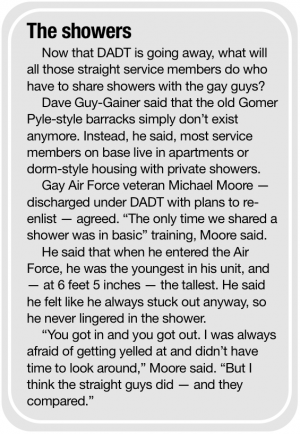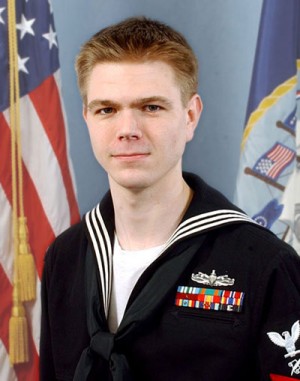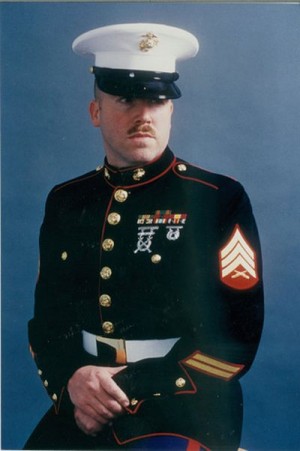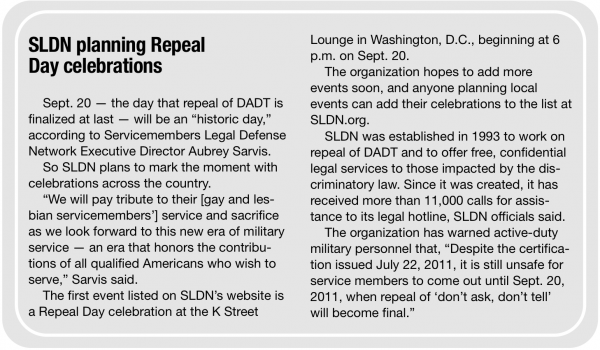As the process of repealing DADT nears its end, some gay servicemembers discharged under the policy are considering the possibility of re-enlisting
DAVID TAFFET | Staff Writer
taffet@dallasvoice.com
Since the military’s “don’t ask, don’t tell” policy — prohibiting gays and lesbians from serving openly in the U.S. military — was first enacted in 1993, more than 14,000 men and women have been discharged, according to the Government Accounting Office.
Now that the policy has been repealed by Congress, in a vote last December, and since that repeal has been certified by the Pentagon and President Obama, some of those gay and lesbian former servicemembers plan to re-enlist.
DADT repeal will be complete Sept. 20, 60 days after the president, Secretary of Defense Leon Panetta and the Chairman of the Joint Chiefs of Staff signed the certification of repeal.
Of those discharged under DADT, 2,215 were in critical positions, according to the GAO which, in its latest report, estimated that each dismissal cost the government $52,800. That’s a total of about three-quarters of a billion dollars.
Servicemembers Legal Defense Network estimates the actual cost of each dismissal was much higher.
But there is more to these discharges than numbers and politics. Behind each one is a very personal story of a life that suddenly veered in a new and unexpected direction.
Michael Moore
Michael Moore graduated from Seagoville High School a year early then enlisted in the Air Force in 2004 at the age of 17. He was 19 and stationed in Germany when he began to come out.
And technically he did tell.
“I told one person,” he said.
During his coming-out process, Moore approached a supervisor in another department and asked her what would happen if he came out.
“The next morning, she came up and told me she was going to report it,” he said.
Moore said his sergeant called him in and yelled at him, then they sent him to counseling.
“They were afraid I was going to commit suicide. They were concerned because I was going career,” Moore said.
But he knew the concern wasn’t for him and certainly not for the military career he had planned. They only sent him to counseling to cover themselves.
His discharge process began immediately.
Fighting the discharge would have entailed a lengthy and expensive court battle in civil court, something he couldn’t afford. Besides, Moore said, he didn’t think he could win in court anyway.
“It would have just delayed the inevitable,” he said.
Moore described the administrative discharge proceeding as one-sided and unfair. He said the attorney assigned to his case was in another country and he spoke to him only once. Within two months, Moore was out of the service.
Now it’s five years later, and DADT is ending, and Moore said he hopes to return to the service, but only after he finishes his degree.
“I want to go back as an officer,” he said.
He is studying for a degree at the Art Institute of Dallas that will qualify him to re-enter as an officer.
“On the one hand, I’m glad it happened,” he said. “I got to know who I am. Before I went in, I didn’t even know what gay meant.”
Because of his service, Moore receives government assistance toward his education. But because of DADT, he said he’s only receiving half of what others who completed even a two-year hitch get.
Moore hopes that those who are in the service are careful about coming out. Just because it’s legal, does mean coming out will necessarily be safe. He said he wonders if the woman he told had changed her attitude.
“She knows what she did,” he said, “and she’ll have to live with it.”
Jeremy Johnson
Jeremy Johnson of Maryland served in the Navy and came out to his commanding officer in 2007 after realizing there was no way to successfully juggle his private life and his professional life in the military as long as he remained closeted.
“I was under a whole lot of pressure being in the service in a position of leadership,” Johnson said. “I was under scrutiny.”
While some commanders would immediately start trying to discharge someone who came out, Johnson said his commander instead started looking for ways to keep him in the Navy.
“He told me, ‘I think things will change if you’ll just hang on,’” Johnson recalled.
Because his command needed him, “Technically, they could keep me,” Johnson said. But he was discharged anyway, after 10 years of service.
After leaving the Navy, Johnson worked for a year as a contractor in the same position he left. In August 2008, he went back to school fulltime and now has one year left to complete his degree at University of Maryland.
He also works at The Palm Center, which does research on sexual minorities in the military.
Now, four years after he was discharged, Johnson is exploring the possibility of re-enlisting.
“I’m looking to go back as a reservist,” he said. “I have half my career in.”
One setback is that there is currently no room for him to return at his former level.
“They have allotments of how many can be in a job at a pay grade,” Johnson said. “They’re at 104 percent and won’t take me.”
He said that the military used to allow someone to drop a pay grade when they re-enlisted, but no longer.
Once he has his degree, Johnson said he would put together an officer package and if the Navy cannot accommodate him, he may find an opportunity in the Army or National Guard.
Johnson believes one thing brought down DADT — Facebook, which allowed gay and lesbian troops to connect.
“Every time you transfer, you have to seek out the gay underground,” he said. “On one base, there might be fractured circles.”
He said that Facebook led to social media specifically for those in the military like OutServe and OutMilitary.com. As more gay and lesbian service members met, they also organized.
Justin Elzie
Justin Elzie agrees that without the Internet, anti-DADT protests like those at the White House last year that led to the arrest of Lt. Dan Choi as well as GetEqual activist Mark Reed-Walkup of Dallas would not have happened.
And Elzie said he believes those demonstrations were instrumental in bringing an end to DADT.
Elzie was the first person dismissed from the Marine Corps under DADT.
He had already served 10 years in 1993 when President Bill Clinton came into office after pledging during his campaign to issue an executive order allowing gays and lesbians to serve openly. And Elzie was ready to announce that he was gay as soon as that executive order was issued.
But Congress derailed Clinton’s plan, forcing him into a compromise that came to be known as “don’t ask, don’t tell.” Under this new congressionally-mandated rule, gays and lesbians could serve in the military as long as they stayed deeply closeted. And while military leaders could still discharge someone for being gay, they weren’t supposed to go around asking about servicemembers’ sexual orientation unless they had good reason.
But Elzie, who had served in Operation Desert Storm in Iraq, made his announcement on ABC News anyway.
“I was pretty naïve back then,” Elzie said recently. But his naivete aside, he knew he was putting his military career on the line when he came out: Before he came out, the commandant of the Marine Corps made news by announcing that there were no gay or lesbian Marines. Elzie couldn’t let that lie stand.
“I just couldn’t stand by and not say a thing,” he said.
Elzie had planned at the time to stay in the military just three more months. But with his announcement, the Marine Corps held an administrative hearing and discharged him. So he sued and won, a move that kept him in the service for four more years while the case progressed.
In the early days of DADT, there were some legal successes; Elzie was among them. He lined up character witnesses and put together a brief detailing his successful military record, and the court ordered the Marine Corps to reinstate him.
During those four extra years, Elzie was recommended for promotion twice. Both times, the Pentagon refused to allow him to be promoted and in 1997, he was forced out of the service.
“They wanted to make an example of me,” Elzie said.
What happens now
Log Cabin Republicans in 2004 filed a federal lawsuit challenging the constitutionality of DADT, claiming that the policy violates the first and fifth amendments. Federal court Judge Virginia Phillips ruled in Log Cabin’s favor in October 2010 and issued an injunction against the policy — an injunction that was promptly stayed by the 9th Circuit Court of Appeals.
 The appeals court lifted the stay in July this year, saying the Justice Department has been unable to meet the legal standard needed to justify keeping it in place. Despite the fact that Congress repealed DADT last December and the repeal has since been certified, formal arguments for the appeal in the Log Cabin case are set for Aug. 29.
The appeals court lifted the stay in July this year, saying the Justice Department has been unable to meet the legal standard needed to justify keeping it in place. Despite the fact that Congress repealed DADT last December and the repeal has since been certified, formal arguments for the appeal in the Log Cabin case are set for Aug. 29.
Elzie said that he believes the ruling last October in the Log Cabin lawsuit forced the Obama administration and Congress to repeal DADT. And he hopes the case continues through the courts despite the repeal, because he said he sees a difference between the judicial proceedings and the congressional repeal.
“The repeal says we can serve,” he said. “The Log Cabin case says we’re equal,” Elzie clarified, adding that while the repeal of the law will eventually change attitudes in society and in the military, the change won’t come easy. Anti-gay commanding officers, he noted, will likely continue to make life hard for gays and lesbians under their command.
Having openly gay and lesbian people in the military will inevitably effect change in the larger society, Elzie suggested, because when people from less progressive areas of the country serve together with gays and lesbians who are both open and professional, they will carry that experience back home with them after their service.
North Texan Dave Guy-Gainer, a gay military veteran now on the board of Servicemembers Legal Defense Network, has long been one of those in the trenches in the fight to get rid of DADT. What does he think will happen on Sept. 20 when repeal is complete and DADT is finally laid to rest: “Massive hurricanes, disastrous floods and violent tornados.”
Then again, Guy-Gainer said, probably nothing will happen, and all that will be different is the military will not be wasting time and money throwing out well-trained personnel.




















Great story David! FYI – https://OutMilitary.com is now featuring in-depth interviews with gay active duty servicemen and women… This week features “T.J.” a bi-sexual man serving in the U.S Air Force in Turkey.
Wonderful article. Great to see this depth of coverage in the Dallas Voice. I suspect the Dallas Morning News will not give this story any ink at all.
The late Oscar Levant once said: “Out of the mouths of babes comes…oatmeal.” Jeremy Johnson is getting a little long in the tooth to “blame it on his youth,” but his belief that “one thing brought down DADT—Facebook,” is yet another example of his gift for idiotic statements. There were underground gay networks not just before Facebook but before the Internet—going all the way back to WWII. While no one can dispute that they’ve grown exponentially as the result of the Net and “social networking” sites, there is no evidence that either of the groups he mentions played ANY significant role in the passage of repeal authorization.
Thank you for your story David. Not only lgb servicemembers can serve openly with the DADT repeal, but also silent partners/spouses of the servicemembers can now be out without jeopardizing careers of their other half. Strong families = Strong servicemembers. http://www.facebook.com/milpfc
Outstanding story.
We served under the same flag and took the same oath to support and defend the Constitution. That is the only thing that matters to me as a terminally heterosexual Veteran.
I am pleased that DADT will end soon. Many people worked hard to make it happen.
Chair, Texas Young Democrats Veterans Caucus
Member, Stonewall Democrats of Denton County
MM2 (NUKE/SW) US Navy 2002-08